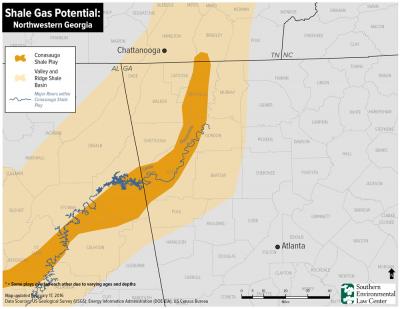Georgia passes modern-day fracking protections into law
This week, Governor Nathan Deal signed Georgia’s first bill governing fracking into law, updating the state’s antiquated drilling regulations to better protect local communities and drinking water.
Commonly referred to as fracking, hydraulic fracturing is a technique that uses horizontal drilling and pumps fluids to break up shale formations. This allows natural gas trapped in tiny pockets to be economically extracted. Georgia’s previous regulations did not include any restrictions on fracking, and many communities throughout the state were concerned about the potential impacts from this emerging industry.
Fracking operations can lead to a significant industrial footprint, result in enormous amounts of heavy truck traffic, and can cause groundwater contamination and other environmental problems.
The new law is timely. The Conasauga Shale Field underlying northwest Georgia has been attracting interest from developers in recent years, leading many local residents to question the real risks fracking can pose.
Georgia’s new law allows the state Department of Natural Resources to create an oil and gas board to review and issue permits and regulate drilling activities. The law will ensure extensive public involvement in advance of fracking operations and require companies to monitor groundwater quality, clean up abandoned sites, and disclose the chemicals used in fracking fluids.
Importantly, the law also allows local governments to adopt zoning or land use ordinances that limit the location or timing of drilling and fracking activities. In other states, local efforts to fight fracking have been quashed.
Along with the Coosa River Basin Initiative and other state partners, SELC played an important role in working closely with state Representative John Meadows to develop this legislation, and will continue to follow the process as state officials draft regulations to implement the law.
We applaud Representative Meadows’ leadership and Governor Deal’s dedication to bringing Georgia’s stone-age drilling laws into the 21st century,” said SELC attorney, April Lipscomb. “By updating and strengthening these protections for local communities, Georgia residents will now have a say in what happens in their own backyards.
The possible natural gas deposits in northwest Georgia are part of the Conasauga Shale Formation.
Georgia Shale

